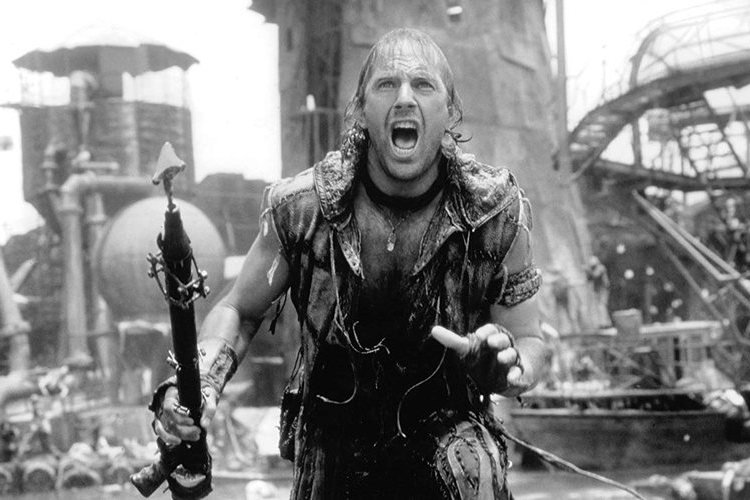WATERWORLD: THE ULYSSES CUT: Pulp Goes Epic Aquapunk
At some point in history, the entertainment press decided to become the journalistic equivalent of Las Vegas bookies and handicap the potential success of films that were still in production. Famous examples include Heaven's Gate and Ishtar, both of which were deemed D.O.A. long before the public got a see a single frame. Both movies picked up a cult following after the dust settled but both had to live through a decade or two being financial duds and laughing stocks before arriving at a modest level of critical success.Another notorious film that fell prey to this trend was Waterworld. It had all the factors to inspire such a pre-judgment in the eyes of the entertainment press: it was an production with a record-breaking budget built on an esoteric premise, the leading man fought with the director (who ultimately quit) and it suffered plenty of costly setbacks in during production, including the weather-induced destruction of an entire set. The lengthy shoot and post-production process gave these stories time to ferment in the public consciousness and thus Waterworld was deemed a dud well before it arrived.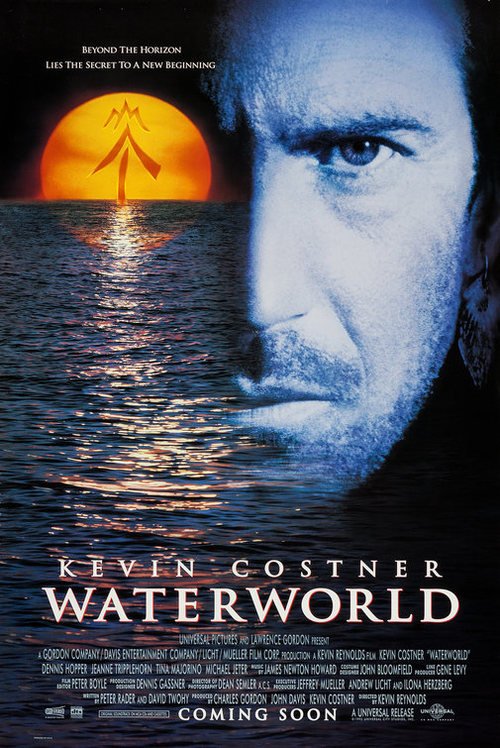 However, time has been kinder to Waterworld than its press reports were. An extended version of the film that debuted on t.v. fleshed out the choppy narrative of the theatrical cut, helping it expand its cult following and leading its new fanbase to create the "Ulysses" cut, a three-hour version whose sprawl gives the film an epic quality that suits it much better than the truncated original version. The Ulysses Cut is the version utilized for this review.The premise applies spaghetti western and pirate movie elements to post-apocalyptic sci-fi. In a distant future where the earth has flooded, the surviving populace lives its life on the sea. Mariner (Kevin Costner) is a grizzled loner who gets caught between survivors at a colony who want to destroy him because he is a mutant who can breath underwater and Smokers (i.e. pirates) out to destroy the colony. He narrowly escapes with the help of trader Helen (Jeanne Tripplehorn) and orphan Enola (Tina Majorino). The Smokers, led by the bombastic Deacon (Dennis Hopper), give chase because Enola has a map tattooed on her back that may lead to a fabled destination called "Dryland."
However, time has been kinder to Waterworld than its press reports were. An extended version of the film that debuted on t.v. fleshed out the choppy narrative of the theatrical cut, helping it expand its cult following and leading its new fanbase to create the "Ulysses" cut, a three-hour version whose sprawl gives the film an epic quality that suits it much better than the truncated original version. The Ulysses Cut is the version utilized for this review.The premise applies spaghetti western and pirate movie elements to post-apocalyptic sci-fi. In a distant future where the earth has flooded, the surviving populace lives its life on the sea. Mariner (Kevin Costner) is a grizzled loner who gets caught between survivors at a colony who want to destroy him because he is a mutant who can breath underwater and Smokers (i.e. pirates) out to destroy the colony. He narrowly escapes with the help of trader Helen (Jeanne Tripplehorn) and orphan Enola (Tina Majorino). The Smokers, led by the bombastic Deacon (Dennis Hopper), give chase because Enola has a map tattooed on her back that may lead to a fabled destination called "Dryland."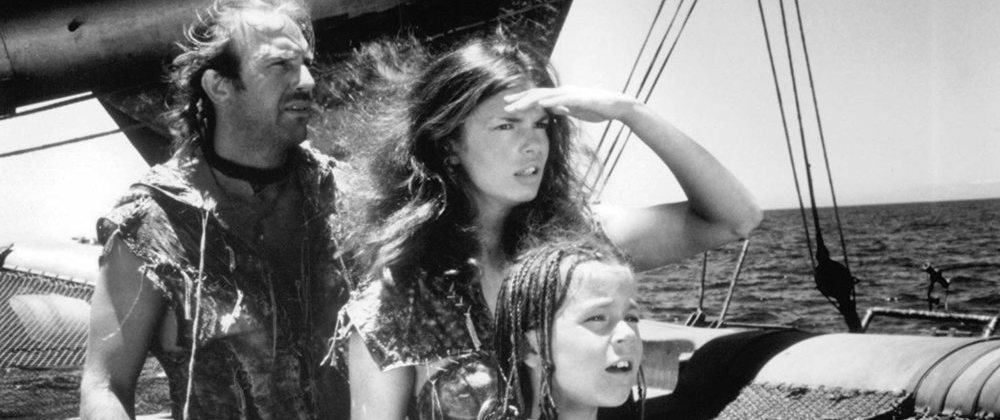 If Waterworld sounds like eccentric pulp fiction, that's because it is. The hero is basically a combination of Mad Max and the Sub-Mariner, he's got an anti-hero complex right out of a spaghetti western (with a dash of Shane) and the story combines Indiana Jones cliffhangers, swashbuckler action and post-apocalyptic elements that evoke Planet Of The Apes and Logan's Run. Call it derivative if you like but it shows imagination and excitement in how it works out its water-logged world. There is also an oft-underappreciated sense of satirical humor in its depiction of the villains, who operate like corporate raiders as much as they do pirates and are led by a demagogue who evokes a faux-holiness to keep his flock in line.This hothouse stew of elements plays because there is a strong cast to keep it from drifting off into the pulpy ether. Costner intriguingly plays against the noble leading man image he had developed in prior hits, making his hero an edgy isolationist who struggles with the idea of teaming with survivors. Tripplehorn brings both dramatic gravity and a nice comic sense as the person challenging him to change and Hopper devours the scenery with delight as an amusingly sleazy villain. Majorino gives a nice, natural performance, avoiding "cute kid" obnoxiousness, and the character actor cast is likeably diverse: familiar faces like Robert Joy, Leonardo Cimino and Rick Aviles all pop up here.At three hours and a few hundred million dollars in budget, Waterworld is also overblown to an operatic extent. However, to complain about that is to miss the point. Pulp fiction often carries a cheap price tag so it's a delicious indulgence to see it pursued with a Hollywood level of opulence here. The action has a massive sense of scope: there's a Rube Goldberg-esque complexity to the setpieces, all of which are achieved with real stunts, fights and explosions. The tangible reality of the practical effects gives the action an eye-popping sensibility you just can't get with digital effects.
If Waterworld sounds like eccentric pulp fiction, that's because it is. The hero is basically a combination of Mad Max and the Sub-Mariner, he's got an anti-hero complex right out of a spaghetti western (with a dash of Shane) and the story combines Indiana Jones cliffhangers, swashbuckler action and post-apocalyptic elements that evoke Planet Of The Apes and Logan's Run. Call it derivative if you like but it shows imagination and excitement in how it works out its water-logged world. There is also an oft-underappreciated sense of satirical humor in its depiction of the villains, who operate like corporate raiders as much as they do pirates and are led by a demagogue who evokes a faux-holiness to keep his flock in line.This hothouse stew of elements plays because there is a strong cast to keep it from drifting off into the pulpy ether. Costner intriguingly plays against the noble leading man image he had developed in prior hits, making his hero an edgy isolationist who struggles with the idea of teaming with survivors. Tripplehorn brings both dramatic gravity and a nice comic sense as the person challenging him to change and Hopper devours the scenery with delight as an amusingly sleazy villain. Majorino gives a nice, natural performance, avoiding "cute kid" obnoxiousness, and the character actor cast is likeably diverse: familiar faces like Robert Joy, Leonardo Cimino and Rick Aviles all pop up here.At three hours and a few hundred million dollars in budget, Waterworld is also overblown to an operatic extent. However, to complain about that is to miss the point. Pulp fiction often carries a cheap price tag so it's a delicious indulgence to see it pursued with a Hollywood level of opulence here. The action has a massive sense of scope: there's a Rube Goldberg-esque complexity to the setpieces, all of which are achieved with real stunts, fights and explosions. The tangible reality of the practical effects gives the action an eye-popping sensibility you just can't get with digital effects.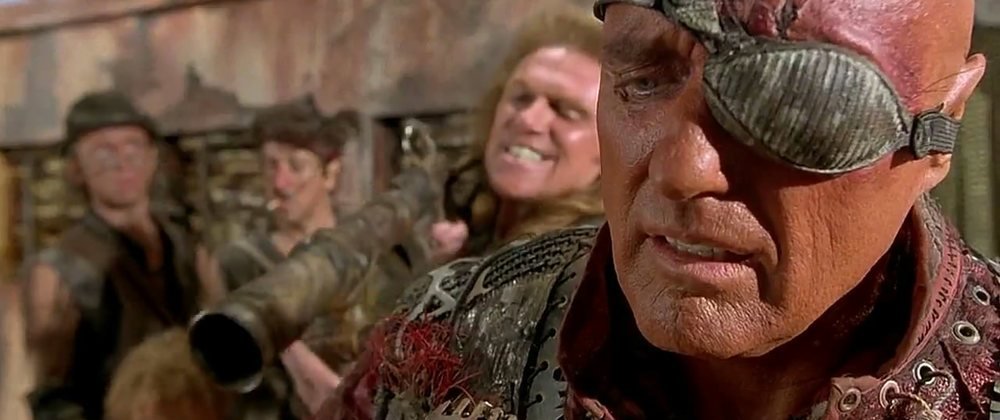 The same kind of gigantic yet hand-crafted sensibility extends to the gritty yet epic production design. The sets and props layers in all sorts of fascinating details to depict a society run on salvaged, retrofitted technology of a dead world (You've heard of cyberpunk and steampunk? This is aquapunk). This design and the action work hand-in-glove with the direction from Kevin Reynolds, whose sweeping visual sense heightens the sense of extravagance.And in keeping with the film's sense of bombast, Waterworld is best appreciated at the Ulysses Cut length of three hours. In this version, it achieves an effective structure: the first hour throws the audience headlong into its future world with plentiful action, the second hour eases up for a more contemplative stretch that develops the complexity of its hero and his relationship with his potential adopted family of Helen and Enola (with some plot complications and moments of tension) and then ramps up for an impressive final hour that delivers character, action and plot payoffs. Even better, this version of the film a thoughtful coda that ends things on a more emotionally satisfying manner than the theatrical version.In short, Waterworld is probably too eccentric in any version for the mass audience it was made for but it's a extravagant feast for pulp fiction lovers with a yen for post-apocalypic thrills. If you think you fit in the latter category, go for the Ulysses Cut. Rarely do your weirdest cult movie urges get rewarded on this grandiose a scale.
The same kind of gigantic yet hand-crafted sensibility extends to the gritty yet epic production design. The sets and props layers in all sorts of fascinating details to depict a society run on salvaged, retrofitted technology of a dead world (You've heard of cyberpunk and steampunk? This is aquapunk). This design and the action work hand-in-glove with the direction from Kevin Reynolds, whose sweeping visual sense heightens the sense of extravagance.And in keeping with the film's sense of bombast, Waterworld is best appreciated at the Ulysses Cut length of three hours. In this version, it achieves an effective structure: the first hour throws the audience headlong into its future world with plentiful action, the second hour eases up for a more contemplative stretch that develops the complexity of its hero and his relationship with his potential adopted family of Helen and Enola (with some plot complications and moments of tension) and then ramps up for an impressive final hour that delivers character, action and plot payoffs. Even better, this version of the film a thoughtful coda that ends things on a more emotionally satisfying manner than the theatrical version.In short, Waterworld is probably too eccentric in any version for the mass audience it was made for but it's a extravagant feast for pulp fiction lovers with a yen for post-apocalypic thrills. If you think you fit in the latter category, go for the Ulysses Cut. Rarely do your weirdest cult movie urges get rewarded on this grandiose a scale.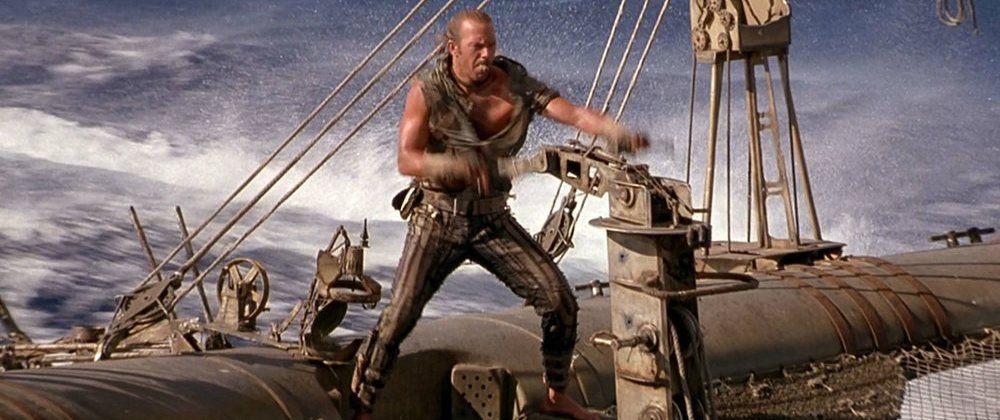 Blu-Ray Notes: Arrow Video just released a triple-disc blu-ray set for Waterworld and its the definitive option for this title. You get three versions of the film (theatrical, extended t.v. cut, Ulysses Cut), a feature-length documentary on the film from Daniel Griffith and scads of additional extras.
Blu-Ray Notes: Arrow Video just released a triple-disc blu-ray set for Waterworld and its the definitive option for this title. You get three versions of the film (theatrical, extended t.v. cut, Ulysses Cut), a feature-length documentary on the film from Daniel Griffith and scads of additional extras.


